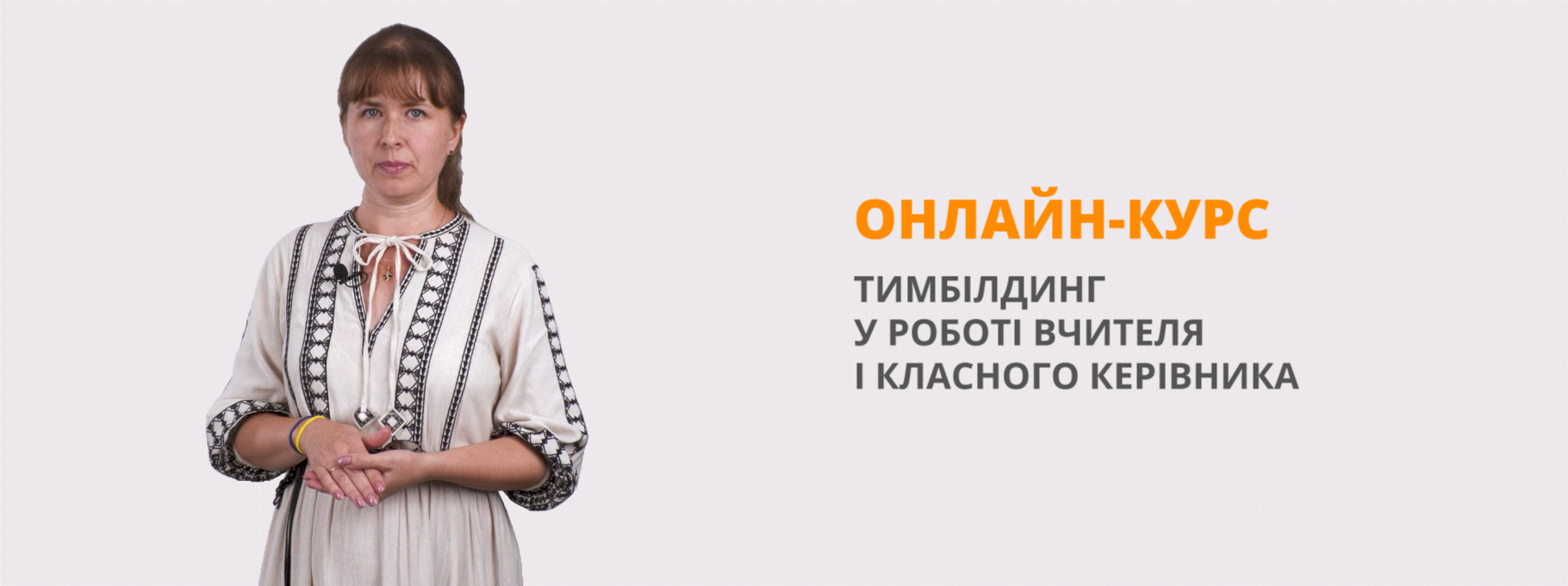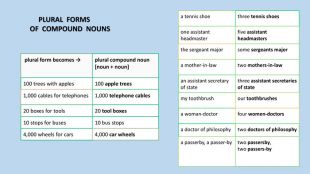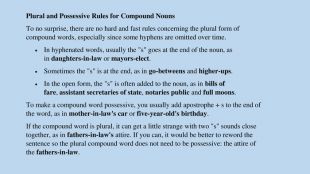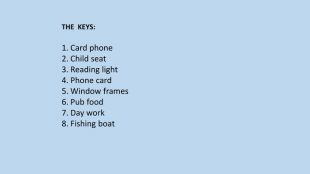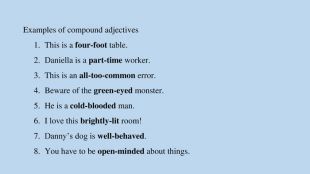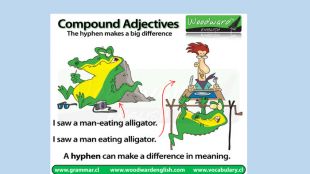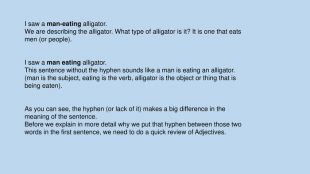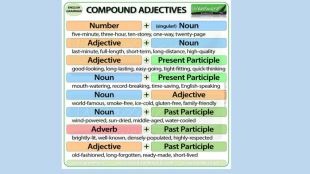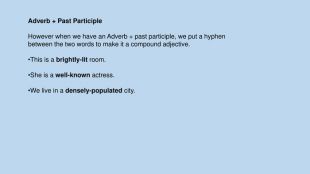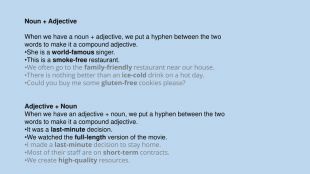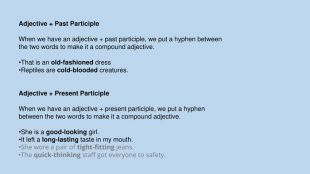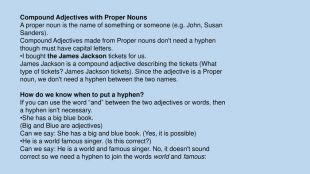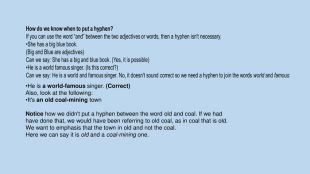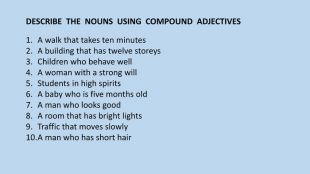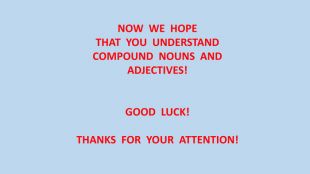Презентація на тему "Compounds"





![a tennis shoethree tennis shoesone assistant headmasterfive assistant headmastersthe sergeant majorsome sergeants majora mother-in-lawtwo mothers-in-lawan assistant secretary of statethree assistant secretaries of statemy toothbrushour toothbrushesa woman-doctorfour women-doctorsa doctor of philosophytwo doctors of philosophya passerby, a passer-bytwo passersby, two passers-by PLURAL FORMS OF COMPOUND NOUNS plural form becomes →plural compound noun[noun + noun]100 trees with apples100 apple trees1,000 cables for telephones1,000 telephone cables20 boxes for tools20 tool boxes10 stops for buses10 bus stops4,000 wheels for cars4,000 car wheels a tennis shoethree tennis shoesone assistant headmasterfive assistant headmastersthe sergeant majorsome sergeants majora mother-in-lawtwo mothers-in-lawan assistant secretary of statethree assistant secretaries of statemy toothbrushour toothbrushesa woman-doctorfour women-doctorsa doctor of philosophytwo doctors of philosophya passerby, a passer-bytwo passersby, two passers-by PLURAL FORMS OF COMPOUND NOUNS plural form becomes →plural compound noun[noun + noun]100 trees with apples100 apple trees1,000 cables for telephones1,000 telephone cables20 boxes for tools20 tool boxes10 stops for buses10 bus stops4,000 wheels for cars4,000 car wheels](/uploads/files/331850/220337/236313_images/6.jpg)





















a tennis shoethree tennis shoesone assistant headmasterfive assistant headmastersthe sergeant majorsome sergeants majora mother-in-lawtwo mothers-in-lawan assistant secretary of statethree assistant secretaries of statemy toothbrushour toothbrushesa woman-doctorfour women-doctorsa doctor of philosophytwo doctors of philosophya passerby, a passer-bytwo passersby, two passers-by PLURAL FORMS OF COMPOUND NOUNS plural form becomes →plural compound noun[noun + noun]100 trees with apples100 apple trees1,000 cables for telephones1,000 telephone cables20 boxes for tools20 tool boxes10 stops for buses10 bus stops4,000 wheels for cars4,000 car wheels
windowreadingseatpubdayphonechildlightfishingcardtablefoodframeworkboat. I. I only have coins on me and that's a____ . I will have to see if there is a public phone in that bar.2. I want to put a_____ in the car as they say it really makes toddlers safer while driving.3. John was furious with the airline company. He sat on that plane for 14 hours and his ______ didn't work. He couldn't even finish that novel he was reading during the flight. He had to try and sleep.4. "What type of credit card is that?" "That's not a credit card. That's a_____ . I use it once a week to call my mum back home in New Zealand."5. All the_____ in this house have to be repainted. Otherwise, they will rot over the winter and then we may not be able to open the windows in the spring.6. English restaurants have a terrible reputation, but the_____ is very tasty.7. I worked at night for so long that when I finally started to do some _____, I found it really strange.8. A _____sank off the Spanish coast last night. Both fishermen were saved by the coast guard.
Compound adjectives. A compound adjective is an adjective that contains two or more words. In general we put a hyphen between two or more words (before a noun) when we want them to act as a single idea (adjective) that describes something. I live in an English-speaking country. English-speaking is an adjective (used to describe the country). We use a hyphen to connect the word English with speaking to show that it is one adjective (or one idea). This adjective with two words joined by the hyphen is called a compound adjective. Some more examples of compound adjectives are: Our office is in a twenty-storey building. I have just finished reading a 300-page book. He is a well-known writer.
I saw a man-eating alligator. We are describing the alligator. What type of alligator is it? It is one that eats men (or people). I saw a man eating alligator. This sentence without the hyphen sounds like a man is eating an alligator.(man is the subject, eating is the verb, alligator is the object or thing that is being eaten). As you can see, the hyphen (or lack of it) makes a big difference in the meaning of the sentence. Before we explain in more detail why we put that hyphen between those two words in the first sentence, we need to do a quick review of Adjectives.
Periods of Time. When he have compound adjectives using a number + a time period, that word referring to a time period is in singular form and is joined to the number with a hyphen. I work eight hours every day --> I work an eight-hour day. I'm going on vacation for three weeks --> I have a three-week vacation. There was a delay of 5 seconds --> There was a five-second delay. Notice how we normally write the number as a word, not in numerical form And remember it is important NOT to add an S at the end of the compound adjective. I had a three-week vacation NOT three-weeks vacation.
Number + Singular Noun. When we have a number before a noun in a compound adjective, that noun is always in singular form. This not only applies to periods of time as we have already seen but with other nouns too. Some examples of compound adjectives that are made from a number + singular noun include: five-minute, three-hour, ten-storey, one-way, twenty-page. Our example sentences: I had to print a ten-page document. You need to go down that one-way street. We live in a two-storey house.
Noun + Past Participle. When we have a noun + past participle, we put a hyphen between the two words to make it a compound adjective. We should start using wind-powered generators to cut costs. I love eating sun-dried raisins. Noun + Present Participle. When we have a noun + present participle, we put a hyphen between the two words to make it a compound adjective. I bought some mouth-watering strawberries. That was a record-breaking jump.
Noun + Adjective. When we have a noun + adjective, we put a hyphen between the two words to make it a compound adjective. She is a world-famous singer. This is a smoke-free restaurant. We often go to the family-friendly restaurant near our house. There is nothing better than an ice-cold drink on a hot day. Could you buy me some gluten-free cookies please?Adjective + Noun. When we have an adjective + noun, we put a hyphen between the two words to make it a compound adjective. It was a last-minute decision. We watched the full-length version of the movie. I made a last-minute decision to stay home. Most of their staff are on short-term contracts. We create high-quality resources.
Adjective + Past Participle. When we have an adjective + past participle, we put a hyphen between the two words to make it a compound adjective. That is an old-fashioned dress. Reptiles are cold-blooded creatures. Adjective + Present Participle. When we have an adjective + present participle, we put a hyphen between the two words to make it a compound adjective. She is a good-looking girl. It left a long-lasting taste in my mouth. She wore a pair of tight-fitting jeans. The quick-thinking staff got everyone to safety.
Compound Adjectives with Proper Nouns. A proper noun is the name of something or someone (e.g. John, Susan Sanders). Compound Adjectives made from Proper nouns don't need a hyphen though must have capital letters. I bought the James Jackson tickets for us. James Jackson is a compound adjective describing the tickets (What type of tickets? James Jackson tickets). Since the adjective is a Proper noun, we don't need a hyphen between the two names. How do we know when to put a hyphen?If you can use the word “and” between the two adjectives or words, then a hyphen isn't necessary. She has a big blue book.(Big and Blue are adjectives)Can we say: She has a big and blue book. (Yes, it is possible)He is a world famous singer. (Is this correct?)Can we say: He is a world and famous singer. No, it doesn't sound correct so we need a hyphen to join the words world and famous:
He is a world-famous singer. (Correct)Also, look at the following: It's an old coal-mining town. Notice how we didn't put a hyphen between the word old and coal. If we had have done that, we would have been referring to old coal, as in coal that is old. We want to emphasis that the town in old and not the coal. Here we can say it is old and a coal-mining one.
DESCRIBE THE NOUNS USING COMPOUND ADJECTIVESA walk that takes ten minutes. A building that has twelve storeys. Children who behave well A woman with a strong will. Students in high spirits. A baby who is five months old. A man who looks good. A room that has bright lights. Traffic that moves slowly. A man who has short hair


про публікацію авторської розробки
Додати розробку
